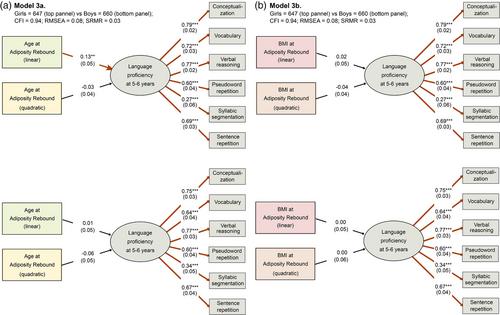During human childhood, brain development and body growth compete for limited metabolic resources, resulting in a trade-off where energy allocated to brain development can decrease as body growth accelerates. This preregistered study explores the relationship between language skills, serving as a proxy for brain development, and body mass index at three distinct developmental stages, representing different phases of body growth. Longitudinal data from 2002 children in the EDEN mother-child cohort were analyzed using structural equation modeling. Our findings reveal a compelling pattern of associations: girls with a delayed adiposity rebound, signaling slower growth rate, demonstrated better language proficiency at ages 5–6. Importantly, this correlation appears to be specific to language skills and does not extend to nonverbal cognitive abilities. Exploratory analyses show that early environmental factors contributing to enhanced cognitive development, such as higher parental socio-economic status and increased cognitive stimulation, are positively associated with both language skills and the timing of adiposity rebound in girls. Overall, our findings lend support to the existence of an energy allocation trade-off mechanism that appears to prioritize language function over body growth investment in girls.
The high energy demand of neurocognitive development leads to a trade-off in human children between brain growth and other biological functions, including body growth.
Previous studies indicate that around age 5, when the brain energy consumption peaks, children typically experience a decrease in body mass known as ‘adiposity rebound’.
A delayed adiposity rebound, indicating slower growth may be associated with enhanced language abilities in children.
Our preregistered study confirms this correlation in girls and further associates early cognitive stimulation with improved language skills and delayed adiposity rebound time.



